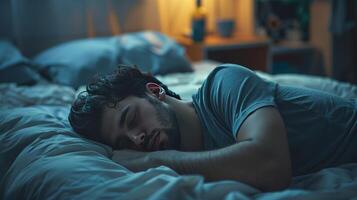Although we all know critical sleep is for health and performance, very few people actually invest the time into improving it on a consistent basis. In this article we will briefly discuss five simple steps to significantly enhance your quality of sleep.
1. Light Exposure
Light regulates circadian rhythm, also known as our biological clock (1). Melatonin production is highly sensitive to light exposure and when exposed to light (particularly blue light) our body’s circadian rhythm is thrown off. Many household electronics such as smartphones, laptops and televisions emit blue light and have been shown to disrupt sleep regulation (2)(3).
Limiting exposure to light several hours prior to going to bed can help you down-regulate and allow your natural biological rhythm to take over. For some this is less practical due to working late into the evening. However, in these instances utilizing blue light blocking glasses does appear to have a beneficial impact (4). Even if you don’t experience difficulty sleeping, exposure to blue light may still impact the quality of sleep you achieve. So if sleep enhancement is a priority, limiting light exposure or using blue light blocking glasses can be an effective approach.
2. Managing Temperature
Temperature also plays a part in sleep optimization. One paper found “Combination of sleep onset and maintenance insomnia has been associated with a 24-h elevation of core body temperature supporting the chronic hyper-arousal model of insomnia” (4). Thus if the temperature in your room is too hot it may increase your core temperature and increase difficulty falling asleep as well as reduce the overall quality of sleep you experience (5)(6).
Research has also shown that reductions in temperature beyond a certain point can inhibit sleep quality (7). Therefore if you live in a particularly hot environment it may be worthwhile to invest in an AC unit to effectively manage room temperature.
3. Caffeine Consumption
Caffeine is a stimulant which may interfere with sleep (8). A 2006 paper by Childs et al. found “Caffeine significantly increased blood pressure, and produced feelings of arousal, positive mood, and high. Caffeine increased the number of hits and decreased reaction times in a vigilance task, but impaired performance on a memory task” (9).
Because of the way which caffeine interacts with adenosine receptors some remain sensitized while others become desensitized. So although a chronic coffee user may feel the need to up the dose to get a similar subjective stimulant the A1 receptors do not desensitize and therefore promote wakefulness even though the individual may not feel the same level of arousal. For this reason it’s likely best to consume caffeine no closer than 6-8 hours prior to going to sleep (10). Although this number does vary depending on the halflife and individual sensitivity to caffeine.
4, Exercise
Physical exercise is critical for general health. But there also appears to be a relationship between exercise and sleep, whereby exercise facilitates improved sleep quality (11). The specific mechanisms for why this is the case, remains unclear. However, the research does show a positive impact of exercise on sleep, stress, mood, and this can be accomplished through a variety of modalities including resistance training, aerobic exercise, and various other recreational sports (12)(13)(14).
The time of day does appear to matter as well. Research has found an association between exercise in close proximity to sleep, and sleep disturbance (15). Although it should be noted that although exercise close to bed may disrupt sleep, it’s still exponentially better than avoiding exercise because of a scheduling constraint.

